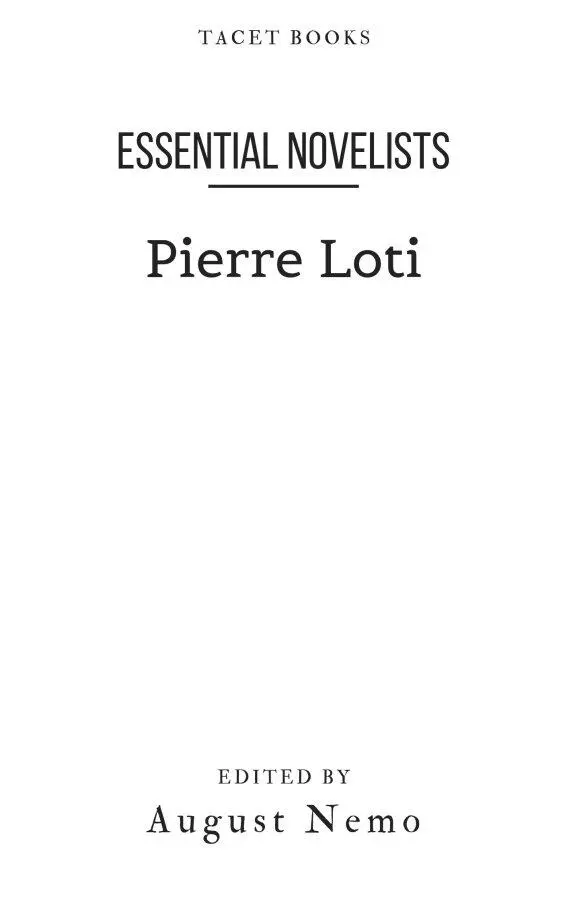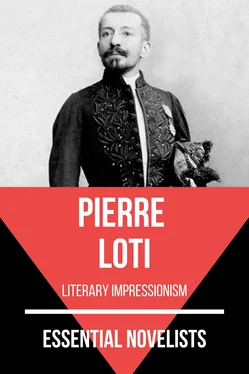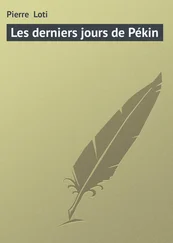
Title Page
Author
Madame Chrysantheme
The Story of a Child Конец ознакомительного фрагмента. Текст предоставлен ООО «ЛитРес». Прочитайте эту книгу целиком, купив полную легальную версию на ЛитРес. Безопасно оплатить книгу можно банковской картой Visa, MasterCard, Maestro, со счета мобильного телефона, с платежного терминала, в салоне МТС или Связной, через PayPal, WebMoney, Яндекс.Деньги, QIWI Кошелек, бонусными картами или другим удобным Вам способом.
About the Publisher Конец ознакомительного фрагмента. Текст предоставлен ООО «ЛитРес». Прочитайте эту книгу целиком, купив полную легальную версию на ЛитРес. Безопасно оплатить книгу можно банковской картой Visa, MasterCard, Maestro, со счета мобильного телефона, с платежного терминала, в салоне МТС или Связной, через PayPal, WebMoney, Яндекс.Деньги, QIWI Кошелек, бонусными картами или другим удобным Вам способом.
 |
|
|

LOUIS-MARIE-JULIEN VIAUD, “Pierre Loti,” was born in Rochefort, of an old French-Protestant family, January 14, 1850. He was connected with the. French Navy from 1867 to 1900, and is now a retired officer with full captain’s rank. Although of a most energetic character and a veteran of various campaigns—Japan, Tonkin, Senegal, China (1900)—M. Viaud was so timid as a young midshipman that his comrades named him “Loti,” a small Indian flower which seems ever discreetly to hide itself. This is, perhaps, a pleasantry, as elsewhere there is a much more romantic explanation of the word. Suffice it to say that Pierre Loti has been always the nom de plume of M. Viaud.
Lod has no immediate literary ancestor and no pupil worthy of the name. He indulges in a dainty pessimism and is most of all an impressionist, not of the vogue of Zola—although he can be, on occasion, as brutally plain as he—but more in the manner of Victor Hugo, his predecessor, or Alphonse Daudet, his lifelong friend. In Loti’s works, however, pessimism is softened to a musical melancholy; the style is direct; the vocabulary exquisite; the moral situations familiar; the characters not complex. In short, his place is unique, apart from the normal lines of novelistic development.
The vein of Loti is not absolutely new, but is certainly novel. In him it first revealed itself in a receptive sympathy for the rare flood of experiences that his naval life brought on him, experiences which had not fallen to the lot of Bernardin de St. Pierre or Chateaubriand, both of whom he resembles. But neither of those writers possessed Loti’s delicate sensitiveness to exotic nature as it is reflected in the foreign mind and heart. Strange but real worlds he has conjured up for us in most of his works and with means that are, as with all great artists, extremely simple. He may be compared to Kipling and to Stevenson: to Kipling, because he has done for the French seaman something that the Englishman has done for “Tommy Atkins,” although their methods are often more opposed than similar; like Stevenson, he has gone searching for romance in the ends of the earth; like Stevenson, too, he has put into all of his works a style that is never less than dominant and often irresistible. Charm, indeed, is the one fine quality that all his critics, whether friendly or not, acknowledge, and it is one well able to cover, if need be, a multitude of literary sins.
Pierre Loti was elected a member of the French Academy in 1891, succeeding to the chair of Octave Feuillet. Some of his writings are: ‘Aziyade,’ written in 1879; the scene is laid in Constantinople. This was followed by ‘Rarahu,’ a Polynesian idyl (1880; again published under the title Le Mariage de Loti, 1882). ‘Roman d’un Spahi (1881) deals with Algiers. Taton-gaye is a true ‘bete-humaine’, sunk in moral slumber or quivering with ferocious joys. It is in this book that Loti has eclipsed Zola. One of his masterpieces is ‘Mon Freye Yves’ (ocean and Brittany), together with ‘Pecheur d’Islande’ (1886); both translated into German by Elizabeth, Queen of Roumania (Carmen Sylva). In 1884 was published ‘Les trois Dames de la Kasbah,’ relating also to Algiers, and then came ‘Madame Chrysantheme’ (1887), crowned by the Academy. ‘Japoneries d’automne’ (1889), Japanese scenes; then ‘Au Maroc’ (Morocco; 1890). Partly autobiographical are ‘Le Roman d’un Enfant’ (1890) and ‘Le Livre de la Pitie et de la Mort’ (1891). Then followed ‘Fantomes d’Orient (1892), L’Exilee (1893), Le Desert (Syria; 1895), Jerusalem, La Galilee (Palestine; 1895), Pages choisies (1896), Ramuntcho (1897), Reflets sur la Sombre Route’ (1898), and finally ‘Derniers Jours de Pekin’ (1903). Many exquisite pages are to be found in Loti’s work. His composition is now and then somewhat disconnected; the impressions are vague, almost illusory, and the mirage is a little obscure, but the intense and abiding charm of Nature remains. Loti has not again reached the level of Madame Chrysantheme, and English critics at least will have to suspend their judgment for a while. In any event, he has given to the world many great books, and is shrined with the Forty “Immortals.”
ALBERT SOREL
de l’Academie Francaise.

TO MADAME LA DUCHESSE de Richelieu MADAME LA DUCHESSE,
––––––––

PERMIT ME TO BEG YOUR acceptance of this work, as a respectful tribute of my friendship.
I feel some hesitation in offering it, for its theme can not be deemed altogether correct; but I have endeavored to make its expression, at least, in harmony with good taste, and I trust that my endeavors have been successful.
This record is the journal of a summer of my life, in which I have changed nothing, not even the dates, thinking that in our efforts to arrange matters we succeed often only in disarranging them. Although the most important role may appear to devolve on Madame Chrysantheme, it is very certain that the three principal points of interest are myself, Japan, and the effect produced on me by that country.
Do you recollect a certain photograph—rather absurd, I must admit—representing that great fellow Yves, a Japanese girl, and myself, grouped as we were posed by a Nagasaki artist? You smiled when I assured you that the carefully attired little damsel placed between us had been one of our neighbors. Kindly receive my book with the same indulgent smile, without seeking therein a meaning either good or bad, in the same spirit in which you would receive some quaint bit of pottery, some grotesquely carved ivory idol, or some fantastic trifle brought to you from this singular fatherland of all fantasy.
Читать дальше

















